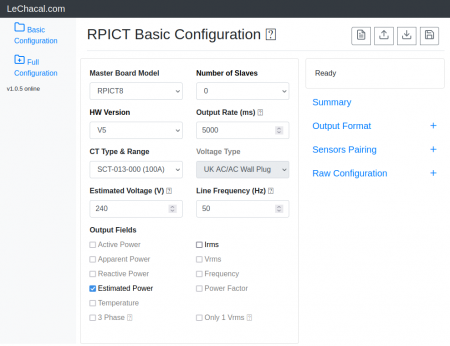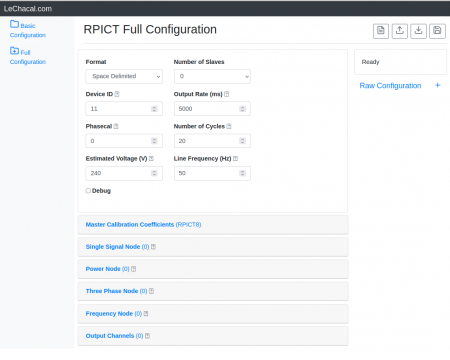Upgrading to sketch version 4
There is now a new release of the default factory sketch. This is version 4.1.0.
Current products are still being sold with the previous 3.2.0 version therefore you should manually install this one if you want to upgrade.
This is for all units RPICT8 RPICT7V1 RPICT4V3 RPIZ_CT4V3T2 all in version 3 4 and 5.
RPICT3T1 and RPICT3V1 and equivalent for raspberrypi zero are not concerned by this upgrade.
What's new?
Version 4 has been through a complete review and allow for multiple type of computation nodes within the same RPICT unit.
The major improvement is the support of a new web interface. This web interface is made to run on the Raspberrypi to allow direct configuration of RPICT units.
However if you want to try and play with the interface just use our online version in the link below.
http://lechacal.com/RPICT/config/generator/latest/index.html
The full documentation is here.
Over Serial Configuration - Sketch 4
Installation
Sketch
Install avrdude on the Raspberrypi. For this just follow the steps in the guide below.
Upload Arduino sketch from Raspberrypi to RPICT
Download the new firmware.
For RPICT version 4 and 5:
wget lechacal.com/RPICT/sketch/RPICT_MCP3208_v4.2.0.ino.hex
Then upload the firmware to the RPICT unit using
lcl-upload-sketch.sh RPICT_MCP3208_v4.2.0.ino.hex
For those using RPICT version 3 follow the guide below instead.
Upgrading to sketch version 4 for RPICT v3
lcl-rpict Package
We have packed together the web interface with all the tools required in a single package.
Get the package:
wget lechacal.com/RPICT/tools/lcl-rpict-package_latest.deb
Install it with
sudo dpkg -i lcl-rpict-package_latest.deb
Run the server
To run the server just launch the command below
lcl-server.sh
You can now access the web interface from any computer/device on your network with the address
http://raspberrypi:8000
or
http://<ip-address>:8000
From there it is possible to configure the RPICT unit directly from the web interface without going through the lcl-rpict-config.py command.
Run the server at boot time
If you prefer having the server running all the time without entering the lcl-server.sh command then follow the steps below.
sudo systemctl start lcl-server sudo systemctl enable lcl-server

